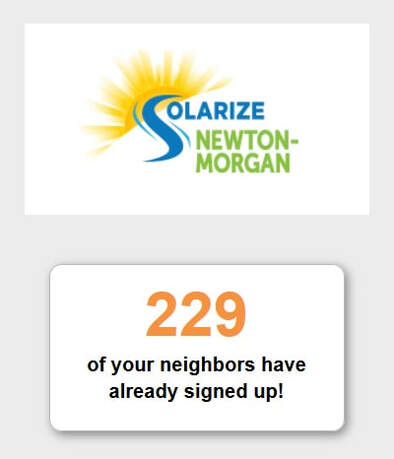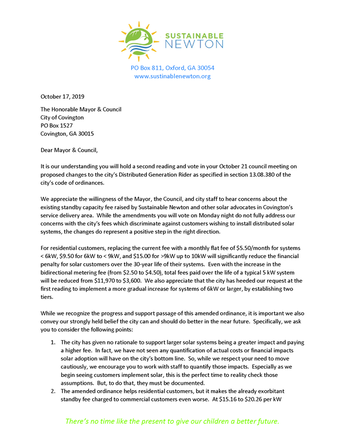|
By Maurice Carter, Sustainable Newton President 
Full disclosure: I'm going to ask for money. So, I owe an explanation of why you should give to Sustainable Newton. But, if you're in a hurry or already convinced, just visit our Giving page. Or look for more information on how to contribute, become a member, etc. on our Connect page.
For those still reading, I've got good news and bad news. But, we can do something about the bad, which is why we need your help. The good: Every day, more Americans agree climate change is happening, that it's caused at least partly by human behavior, and we need to do something about it. This is true even in Newton County, where the Yale Program on Climate Change Communication published the following findings about climate attitudes:
0 Comments
By Theodosia Wade, Sustainable Newton Vice President  Well, this was going to be a final post to wrap up our Solarize Newton-Morgan campaign and tell you all the wonderful things we accomplished with some great local and statewide partners. More on that further down in this post, but first the really big news: Last week, we reported potential good news in Covington, and now it's official. The Covington City Council voted Monday night to reduce the city’s standby capacity fee for customers with residential solar!!!! This addresses a substantial roadblock discouraging many Covington residents who wanted to install solar during our campaign. So, the Solarize Newton-Morgan Campaign is open again for business in Covington. Residential customers have until the end of November to request a free solar evaluation of their property, with signed contracts due by the end of December. To sign up or to learn more, visit the campaign website. This gives customers who purchase their power through the City of Covington the chance to take advantage of bulk purchasing prices for solar and the federal tax credit for 2020. Thanks so much to Mayor Johnston and the City Council for supporting clean, renewable energy options for our community! Now, about this past year…
By Theodosia Wade, Sustainable Newton Vice President
I am so proud of our community! Monday night’s meeting of the Covington City Council was a great example of how government should work for and with the people. Because Mayor Ronnie Johnston and the city council pursued independent ethylene oxide (EtO) air testing in our community, we could get facts without relying on self-reported data from Becton Dickinson (BD). The test results came back showing EtO levels much higher than that deemed safe by the US Environmental Protection Agency (EPA). So, once again, the mayor and council stepped up and made the difficult decision to ask BD to temporarily cease operations.
By Maurice Carter, Sustainable Newton President  Read our letter to Covington Officials Read our letter to Covington Officials When Sustainable Newton partnered with other organizations to launch the Solarize Newton Morgan campaign in the fall of 2018, we were excited to have so many neighbors request a free, no-risk solar evaluation for their property. By the end of the sign-up period, we had registered 229 property owners interested in considering rooftop or ground-mounted solar. But, as we worked with our partners Solar CrowdSource and Alternative Energy Southeast (AES) to evaluate each property, we quickly realized we had a problem. In areas served by utilities like Georgia Power, Snapping Shoals EMC, and Central Georgia EMC, the business case for distributed solar was clear. Property owners willing to make the upfront investment realized they could save tens of thousands of dollars over the 30-year life of their solar system, usually realizing payback on the investment in eight to ten years. But, homes and businesses served by municipal electric companies in Covington, Mansfield, and Oxford learned they faced substantial fees on customers with a distributed electric generation capability (solar, wind, hydro, etc.). These cities purchase power from the Municipal Electric Association of Georgia (MEAG), and MEAG had encouraged its member cities to implement a "standby capacity fee" for distributed generation (DG). The fee, typically based on the size of the solar system, is designed to collect additional revenue to offset lower power bills presented to solar customers consuming less electricity. Ostensibly meant to allow these utilities to recover fixed costs to maintain the power grid, the true effect of the fee is to stifle solar adoption in these service areas, by totally destroying the business case and return on investment. By the Sustainable Newton Board of Directors  On November 5, 2019, Georgia cities head to the polls to elect new mayors and city council members. Locally, in Newton County, residents of Covington, Mansfield, Newborn, Oxford, and Porterdale have offices up for election, but only Covington, Oxford, and Porterdale have contested races (two or more candidates). As a 501(C)(3) charity, Sustainable Newton doesn't endorse specific candidates for any elected office. However, as an advocacy and education organization, we want candidates and voters to carefully consider sustainability-related issues in their platforms and in their voting. So, for the contested races, we sent questions to candidates and are publishing their answers to the public. The questions we asked are: |
Categories
All
Archives
February 2024
|
Photos from Chemist 4 U, shixart1985 (CC BY 2.0), Juhele_CZ, EarthLED, shixart1985, EcuaVoz, Chemist 4 U

 RSS Feed
RSS Feed
